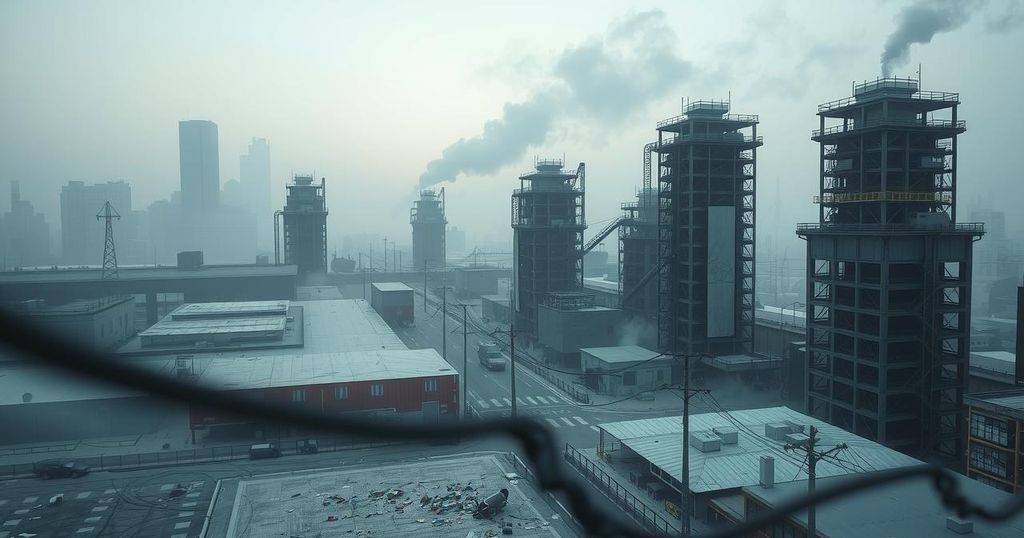Ghana, Nigeria, Chad, and Rwanda: Acknowledged as Among the Most Polluted Countries Globally

The 2024 World Air Quality Report indicates severe pollution levels in Ghana, Nigeria, Chad, and Rwanda, with Chad ranked as the most polluted country globally. Ghana’s pollution has notably risen, impacting public health and the economy. Immediate action is necessary to improve air quality across the continent.
The 2024 World Air Quality Report has revealed escalating pollution levels in Africa, positioning Ghana, Nigeria, Chad, and Rwanda among the world’s most polluted nations. This report underscores a critical air quality crisis that threatens the health and lives of countless individuals.
Chad leads the global pollution list, with a concerning PM2.5 concentration of 91.8 µg/m³, which is nearly 18 times greater than the World Health Organization’s (WHO) annual guideline of 5 µg/m³. Nigeria ranks 11th with 40.1 µg/m³, Rwanda is 9th at 40.8 µg/m³, and Ghana holds the 14th position with 35.8 µg/m³.
PM2.5 particles are notably harmful, as they can penetrate deeply into the lungs and bloodstream, resulting in severe health complications such as respiratory and cardiovascular diseases. Due to their small size, these particles are often undetectable but carry significant health risks.
The University of Chicago’s data highlights that air pollution reduces life expectancy in heavily polluted regions by an average of 2.7 years. In Ghana, estimates suggest that 28,000 fatalities occur annually from air pollution, with daily global deaths attributed to air-related issues reaching approximately 22,192. Spurring action is crucial to mitigate these alarming statistics.
In Ghana, air pollution levels currently exceed WHO recommendations by sevenfold. Accra has been identified as the 16th most polluted capital globally, with a PM2.5 level of 36.3 µg/m³. Unsurprisingly, Kumasi has emerged as more polluted than Accra, with a recorded level of 39.5 µg/m³.
Ghana’s pollution has escalated sharply over the past few years; it ranked 27th in 2022, improved to 17th in 2023, and now stands at 14th in 2024, showing a concerning trend of worsening air quality.
Africa is grappling with severe pollution concerns, yet air quality monitoring remains inadequate. The 2024 report indicates that five of the world’s top ten polluted countries are located in Africa. Only 24 out of 54 African nations have reported air quality data, revealing substantial gaps in monitoring capabilities.
Air pollution in Ghana is a pressing public health emergency, with grim estimates suggesting one Ghanian dies every 19 minutes due to toxic air. If current trajectories continue, approximately 2,333 people may succumb to pollution-related illnesses each month.
Economic repercussions add urgency; the Clean Air Fund warns that unchecked air pollution could impose costs of $137.8 billion by 2040 in Ghana’s urban areas.
On a global scale, 17% of cities meet the WHO air quality guidelines, while some regions exhibit cleaner air. Only seven countries, including Australia and New Zealand, achieved these standards in 2024, with one African city, Nieuwoudtville in South Africa, meeting WHO guidelines.
Drivers of pollution in Africa include rapid urbanization, population growth, industrial emissions, and unregulated waste burning. NGOs now supply a majority of air quality data on the continent, highlighting the critical need for enhanced government oversight.
The escalating air quality issues have prompted experts to demand stricter environmental policies in Ghana. Proposed measures include robust vehicle emission regulations, investments in renewable energy, improved air quality monitoring infrastructure, and stringent policies against burning waste. Immediate action is imperative to avert a worsening crisis in the years ahead.
In conclusion, the 2024 World Air Quality Report highlights an alarming trend of increasing pollution in Ghana, Nigeria, Chad, and Rwanda, underlining the need for urgent governmental intervention. The concerning levels of PM2.5 particles pose serious health risks, warranting public health initiatives to combat this crisis. Furthermore, addressing the broader context of Africa’s air quality issues is essential to ensure better health outcomes and economic stability in the region.
Original Source: www.myjoyonline.com






